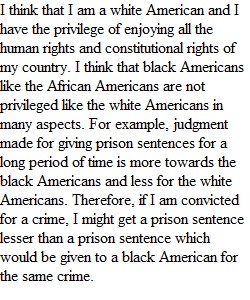


Q Textbook Discussion Chapter 10 Three options - pick at least one: 1) (My top choice, but it does involve listening to two hours of audio) Two recent This American Life episodes discussed segregation in schools. Listen to both (if you do this one you need to listen to both) and share your thoughts: http://www.thisamericanlife.org/radio-archives/episode/562/the-problem-we-all-live-with http://www.thisamericanlife.org/radio-archives/episode/563/the-problem-we-all-live-with-part-two 2) Some state university systems have replaced affirmative action programs with programs that automatically admit the top 10% of the class from each high school in the state.* This ensures that students stuck in poor performing schools can gain admittance even if their test scores are below that of students in better schools who do not make the cut (because they might be just outside the top 10%). To clarify - the thinking here is that because schools are also segregated (by race and class) this ensures that a broad cross section of the state population gets in. These policies are a way for schools to increase minority enrollment without explicitly relying on affirmative action (and studies show they do increase minority enrollment). Is this a better way to spread opportunity? Should anything be done aside from strict admission based on test scores? *This does not fill the entire class and a few students are admitted through separate admissions decisions. 3) We are all complex - far more than can be shown with simple characteristics, but we’ll talk about them anyway. Think about yourself - what characteristics do you have where you are in the majority (privileged) and what ones put you in the minority (really try to find at least one for each side if you chose this one). Think all the categories discussed in the chapter (race/ethnicity and sex) as well as language ability (is English your native language?), socioeconomic class, sexual orientation, religion (are you Christian? Does it matter what denomination?), and anything else I haven’t thought of. How many of these could be hidden at a job interview? What about over years of working in the same office with people?
View Related Questions